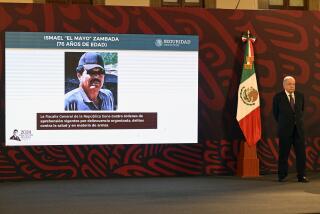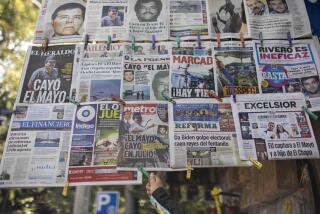High CIA Officials Knew He Aided North, Agent Says
WASHINGTON â The Central Intelligence Agencyâs top officer in Costa Rica, recalled last month after being accused of aiding Marine Lt. Col. Oliver L. Northâs military pipeline to Nicaraguaâs contras , told a White House panel this week that he believes his actions were approved by senior officials in the agency.
The CIA officer, known by the pseudonym Tomas Castillo, told the presidential commission appointed to examine workings of the National Security Council that his work for North was known to and tacitly approved by the CIAâs deputy director of operations, Clair George, and by the head of its Central American Task Force, Alan D. Fiers.
The testimony appears to counter the agencyâs repeated denials that it gave military support to the rebels in 1985 and 1986, a time when Congress had banned all but intelligence support to the contras. The CIA refused to comment.
The account of the testimony, from an authoritative U.S. source, comes amid growing evidence that CIA Director William J. Casey and other agency officials were involved early and deeply in the contra and Iranian arms dealings of North, who was fired from the NSC.
One official, who refused to be named, said that Casey and North met regularly on contras matters as early as 1984 and that their sessions later extended to the mechanics of the Iran arms sales, beginning in 1985.
Other new evidence of a CIA-contra link is contained in the Senate Intelligence Committee report on the Iran scandal, which was released Thursday. Among several new findings, the report documents an April, 1986, meeting of President Reagan, North, Castillo, an unidentified Costa Rican security official and some senior Administration figures.
âItâs fair to say that the agency was deeply involved, operationally, with the Iran arms shipments,â one congressional expert on the scandal said Friday. âI think thereâs less certainty about their dealings with North and the contras. Everyone can read something into that report.
âBut thereâs a lot of boiling water there. Iâm sure the Inouye committee will be interested in pursuing those matters.â
New Senate Hearings
A Senate select committee, headed by Sen. Daniel K. Inouye (D-Hawaii), will begin a new round of hearings on the Iran-contras affair this spring.
Castillo, the CIAâs station chief in Costa Rica until last month, came under investigation by the agency and the White House after it was disclosed that he had passed messages from North to the contra armyâs private supporters in Central America. Most, if not all, of the messages dealt with the sites, timing and logistics of air drops of supplies to the rebels.
The Presidentâs Intelligence Oversight Board concluded this month that Castillo had acted improperly but probably had not violated the law.
The CIAâs inspector general is said to be conducting an internal inquiry that does not address the question of whether higher-ups in the agency approved Castilloâs actions.
This week, however, Castillo reportedly acknowledged playing âa more expansive roleâ in Northâs network than he had previously admitted either to the CIA or the White House.
âScrambledâ Calls
In testimony to the presidential commission, which is headed by former Sen. John Tower (R-Tex.), Castillo said that North issued to him a special encryption device that allowed the two men to conduct âscrambledâ long-distance telephone conversations about the air drops.
Castillo is reported to have acknowledged at least nine such conversations with North. Some, one source said, may have involved secret contras supply operations run out of the Ilopango air base in El Salvador. The CIAâs El Salvador station chief is reported to have been aware of the supply operations from the base but refused to play any role in them, citing the congressional ban on U.S. government aid to the contras.
According to one official, Castillo told the Tower panel that he relayed messages to the contrasâ backers âbecause North had no other way of getting the word to themâ about supply drops.
Superior Knew of Aid
In addition, he is reported to have said that he believed he was acting with the authorization of George, one of Caseyâs top aides, âwho at the least had knowledgeâ of Castilloâs work for North and did not order him to halt.
Castillo reportedly helped organize the contra army from 1981 to 1984 before Congress enacted a two-year ban on U.S. military support to the rebels. He has been suspended with pay pending the outcome of investigations into his work for North.
His testimony to the Tower panel bolsters allegations from a number of sources that North and some of his private associates in the Iran-contras affair had more extensive relations with top CIA officials than has been disclosed.
U.S. officials, speaking on condition that they not be named, have alleged that many of the covert activities that North conducted while he worked at the National Security Council were effectively âmanagedâ by top CIA officials, who gave North intelligence and logistical support.
Through his Iran operations, North has been publicly linked to Duane (Dewey) Clarridge, a CIA official who organized the contra forces with Castillo and later served with North on an inter-agency counterterrorism panel.
But sources said that North was also closely tied to many other CIA executives, including Casey. North met privately with Casey at his Langley, Va., office as early as 1984, one official said, and the two met regularly thereafter--in Langley and in the White House office complex--until North was dismissed last November.
Northâs Contacts
George, who directs covert operations for the CIA, was described by one official as a âmain contactâ who provided North with false documents, intelligence data and other essentials for his secret NSC operations. Fiers is said to have been Northâs primary contact for activities related to the contras, although the nature of those contacts is not clear.
Also, North dealt extensively with Thomas Twetten, head of the agencyâs Near East Division, on the Iranian arms shipments. Twetten, apparently the CIA officer described in the Senate Intelligence Committee report as the âaction officerâ on the Iran project, took a lengthy trip to Europe and the Middle East with North in early 1986.
According to the Senate report, the âaction officerâ learned on that visit of Northâs links to two private figures in the Iran affair, retired Air Force Maj. Gen. Richard V. Secord and financier Albert A. Hakim. On that trip, North described Secord and Hakim as his principal aides on contra activities, with Hakim running European support for the contras, the report states.
âBy March, 1986, the CIA officer knew that North was very active in the contra program,â the report states, adding that Northâs role with the rebels was âwidely knownâ in the agency.
Meetings With Reagan
About a month later, according to the report, President Reagan attended two meetings with North at the White House. The first session was a briefing on a visit to Central America by Elliott Abrams, the State Departmentâs top Latin America official. The second session, the same day, was attended by Reagan, North, Castillo, then-National Security Adviser John M. Poindexter, White House Chief of Staff Donald T. Regan and a Costa Rican security official and his wife.
Records of the session list no topic of discussion, according to the Senate report.
Finally, Casey was well aware of Secordâs aid to North in supplying airplanes and other private assistance for arms shipments to Tehran, according to the report. But documents examined by the Senate panel strongly imply that Casey knew also of Secordâs other, more secret, role in supplying the contras with arms and may have worked to encourage it.
The documents show that Poindexter apparently talked to Casey last Sept. 13 about obtaining a contract for Secord to ferry a cache of captured Soviet weapons from Israel to the contras.
Poindexter earlier had been advised by North to treat the arms shipment as âa private deal between Dick (Secord) and Rabin that we bless.â Israeli Defense Minister Yitzhak Rabin had offered to donate the captured weapons to the contras on behalf of the Israeli government.
According to the documents, Poindexter told North to pressure âBillâ--apparently Casey--to âmake things right for Secord.â
A contras spokesman, Bosco Matamoros, said the rebels did not receive those Israeli arms but did not say whether they had received such arms at other times.
President Reagan views the Senate report on the Iran arms affair as favorable. Page 26.
More to Read
Sign up for Essential California
The most important California stories and recommendations in your inbox every morning.
You may occasionally receive promotional content from the Los Angeles Times.










